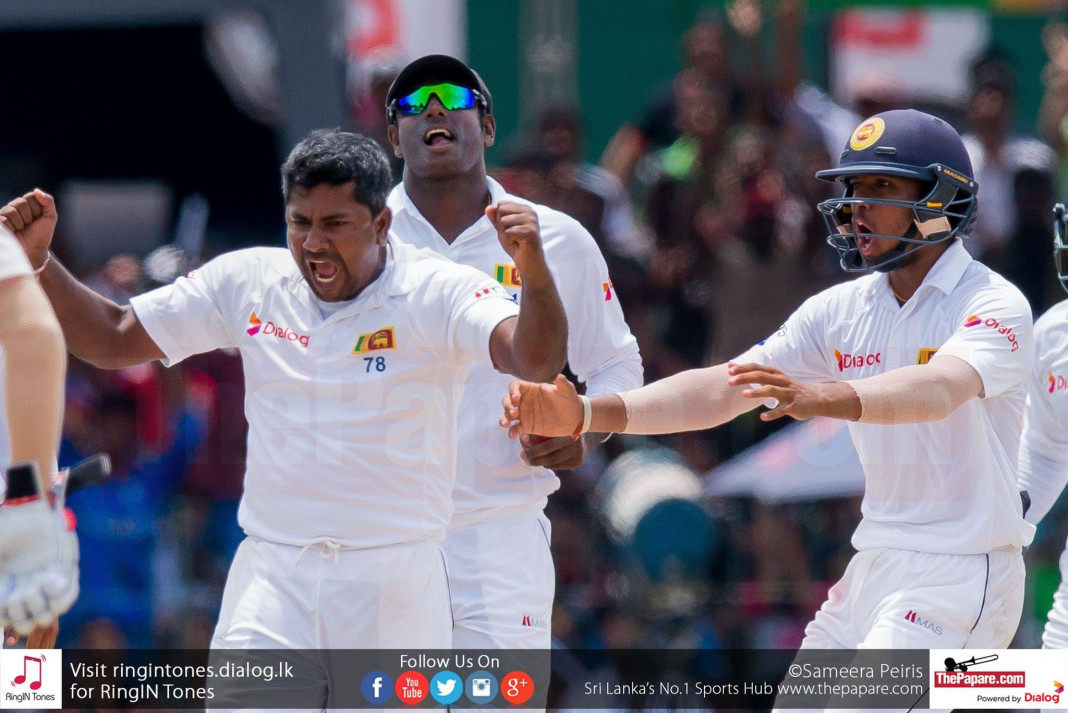“All the world’s a stage. And all the men and women are mere players; they have their exits and their entrances. And one man in his time plays many parts. His acts being seven stages of infant, schoolboy, lover, soldier, justice, pantaloon and old age…” wrote William Shakespeare.
Free Hit contributor
At the premier level, sport is the epitome of the Shakespearean stage. Every player has his part and his entrances and exits. Cricket is no different. One man in his time certainly plays many parts. But the metaphor ends there, as rarely a player has the fortitude to act all seven stages. Rangana Herath belongs to this rarity.
This self-effacing, diminutive left arm trundler defied all odds after ten years in the wilderness to not just act again, but to be the protagonist of Sri Lankan cricket. In his journey to world fame, much has been said about Herath’s spin mastery, unwavering concentration, modest beginnings, and humble servitude. But his embodiment of being just another Sri Lankan is where is he is truly iconized.
Herath does not have the reckoning of a big name school and their old-boys parading him around. Unlike most of his peers, he was not a childhood prodigy touted to be one for the future. He was lucky to be noticed for his batting by Chandika Hathurusingha’s brother. As it is for many things in Sri Lanka, he was at the right place at the right time to be noticed for the wrong reasons. When he was dropped, few noted that he was missing. His comeback surprised many who were trying to find a Murali-replacement in the dazzles of Ajantha Mendis or the wiles of Sachithra Senanayake.
Few expected that a left arm spinner would surpass not only his contemporaries, but also some of the game’s greatest to become one of the best match winners the game has seen. Yet, he will never be the shining star on billboards. He will not be a fashion icon or a racecar driving, tattooed up entertainer in his spare time. He is unlikely to be dancing with the stars. He is the fellow countryman you lean against on a footboard of a crowded bus hanging on to his dear life, simply smiling at adversity.
Hidden beneath that smile, there is a fighter roaring to succeed. A testament to that is Herath’s survival as a forgotten cricketer for much of his youth in the complex maze of Sri Lankan cricketing lore. Many aspiring cricketers before and after Herath have had their dreams shattered by selectors, coaches and onlookers. Those who somehow managed to catch the national attention are then told by a whole country that they simply do not belong there. A handful persists through this constant societal judgment (in cricket and in life). When dropped for a few seasons, many cricketers wilt away under the burden of making ends meet. Coming back for a second act is often a divisive miracle filled with doubt, suspicion, and at times hatred.
For many in their second coming, if the skills do not give way, the body and eventually the mind will. Unlike rich cricket nations, the fringe talent in Sri Lanka has only few straws to grasp onto. In that space is where the 21-year-old Herath had to start a day job as a bank clerk, after his national colors faded away as quickly as they came. Those ten years toiling in the unknown is certain to have molded the steely left arm spinner on display today.
Sri Lanka cricket often look to natural talent at a young age as a marker of future success. While talent is abound in Sri Lanka, missing ingredients in the search for greatness are the temperament, the mental endurance and the fight within to keep afloat when the knees begin to creek, the fingers begin to crack, and dreams begin to crumble. Every player will do well to learn from Herath’s courage, audacity, and hope that must have kept him going when a future as a national player was uncertain. Herath’s lesson for the generations is what he did off-stage when no one was watching, so he could come back to play all seven stages of Shakespearean Man in one Rangana.
And Rangana he does. He is the infant on stage in his merciful begging for a wicket and innocent joy in celebrating one. He is the schoolboy in his yearning to master a dying craft even at the age of 38. He is the soldier in his toil to lead the victory march. He is the justice in expounding his wisdom to the next crop. He is the pantaloon in his rotund heaviness comically diving for a catch in the deep. He is literally the old age.
Herath will be expected to act all his roles on Boxing Day when taking on the on-song South Africans in their own backyard. In the tours to come, whether Herath lights up the arena or not, he will always remain as the icon of struggles behind the smiles of every Sri Lankan.
***Disclaimer: The views and opinions expressed in this article are those of the author’s and do not necessarily reflect the official policy or position of ThePapare.com.














